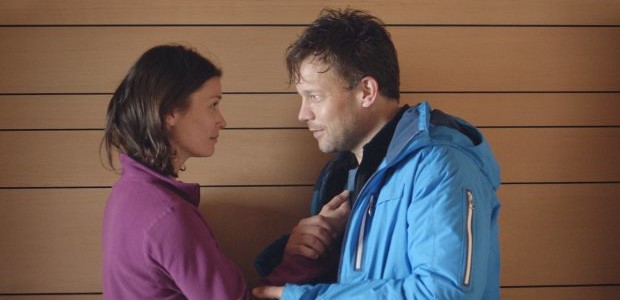Distinguished and rare, Force Majeure (originally titled Turist) is in a league of its own. It’s the type of film you watch without the faintest notion that you are watching it with a silly grin on your face. The last time I experienced something like this (and I did have a silly grin) was while watching The Grand Budapest Hotel. Conceptually, it’s almost the same – a dark comedy disguised as deadpan drama.
With Force Majeure, the hotel here is an upscale ski resort in the French Alps. Cinematography is the first similarity and a huge tick mark in sheer visual splendour. Panoramic vistas of snow covered Alps are filled in several lingering frames. It’s a picture perfect postcard and this is how Swedish writer/director Ruben Östlund introduces us to a family of four that have just checked-in to the resort. They are photographed together in candid poses with smiles as bright as the scene behind them. This would also be the last time we see them smile. On the second day of their five day vacation, Östlund begins his satirical take on the literal as well as figurative meaning of the title. Using sonic explosions to induce artificial avalanches (to prevent snow piling to dangerous levels that could trigger a natural and catastrophic avalanche) the resort experiences a near-miss incident when one such ‘controlled’ avalanche occurs very close to where the family is having their lunch. It’s a magnificent scene set at an outdoor restaurant overlooking the leeward side of a snow covered slope. We get a third-person perspective of nature’s beauty, and simultaneously, her fury (in reference to the title’s literal meaning). Acting on an impulse (the figurative meaning), the father saves himself, leaving his wife and kids in the path of the avalanche. The incident leaves everyone shaken but not as much as patriarch Tomas.
What follows is a complete disintegration of the psyche beginning with an escalating confrontation between Tomas and his wife Ebba and the umbilical disconnect it has on their children. With tensions rising between Tomas and Ebba, we dwell on their emotions, and one after the other, we get a peek into their inner most thoughts on duty, honesty, fidelity, and almost every other nuptial value from the bedroom to the kitchen sink. Meanwhile, Östlund stokes sparks into flames with more sonic detonations, a chance encounter with temptation and the arrival of another couple whose inclusion adds the icing to the fast freezing cake. Pun intended.
The humour in all this is hard to miss. But given the possibility that we might misinterpret what’s transpiring between Tomas and Ebba, Östlund’s already stunning cinematography has a secondary function as well, like Ebba’s increasing frigidity depicted by more sonic booms, or Tomas’ decreasing sense of freedom set against a random shot of bachelors going wild, and several other scenes of ostensible masterstrokes. Force Majeure is so well written, acted and filmed, that it’s difficult to identify a high point and this is precisely why this film is so unpredictably challenging to watch. Even at the end of the film with the family returning home, Östlund begins the story again, this time in the opposite direction. Did I mention impulsive reactions can be unsettling?
Rating: 




